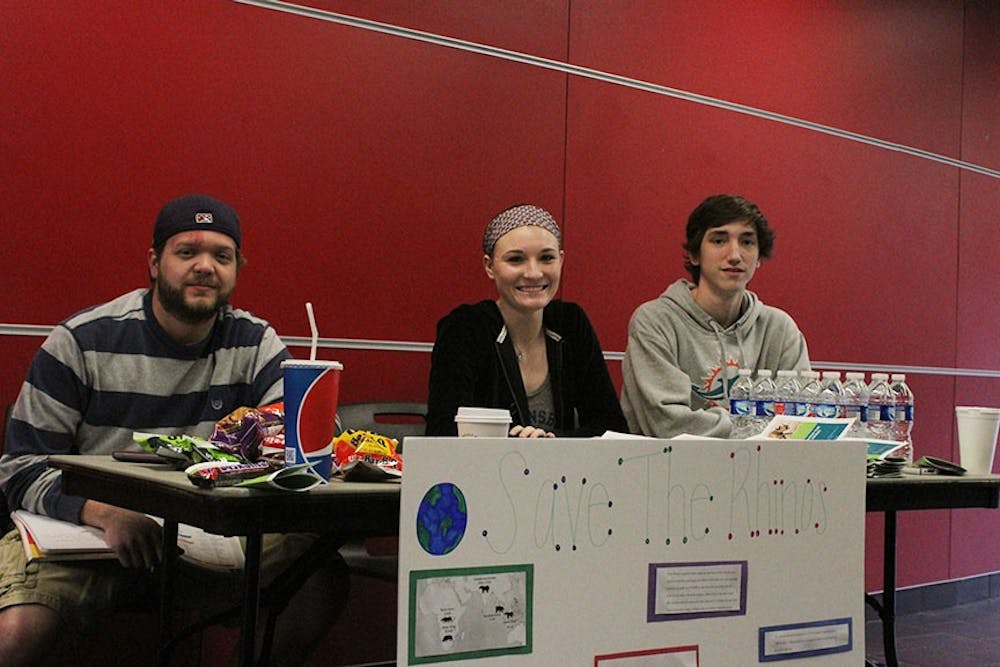From Shippensburg to Vatican City, people around the world of every ethnicity, class and creed united to celebrate Earth Day 2015 to promote awareness of the primary concerns facing humanity — concerns that go far beyond pollution and climate change.
“Man’s relationship with nature should not be guided by greed,” Pope Francis said on Earth Day, in a recorded broadcast posted on earthday.org.
The pope plans to tell every Roman Catholic bishop to make environmental action a religious duty and moral obligation for the church’s 1.2 billion followers, reported USA Today.
Shippensburg made its own mark by gathering the local community on the cold morning of April 25, to pick up garbage around the town.
Shippensburg University students also participated in Earth Day by hosting activities, including an open house at the SU Farm and an event in the quad organized by the Environmental Club.
However, not everyone was celebrating the 45th annual Earth Day, or at least not in the same way as Vatican City or Shippensburg.
“Happy Earth Day 2015: The Earth is doing just fine, thank you,” read one headline from a Fox News article written by Stephen Moore.
Moore insists the state of Earth has improved in terms of resource abundance, purity of air and water, food production and many other factors.
Whether or not he is right, global sustainability efforts are drawing increasing attention and support in every place from the classroom to the United Nations (U.N.).
While SU is exploring the idea of adding a sustainability major, the U.N. is collaborating on and implementing goals for sustainable practices and development.
This type of development is focused on establishing infrastructure and resource management strategies that will allow future generations of people to live poverty-free, without exploiting Earth’s resources.
Since 2000, the U.N. was devoted to accomplishing the Millennium Development Goals (MDG’s), which was a 15-year project, ending this year. The MDG’s focused on issues such as access to safe drinking water and helping the impoverished.
The next 15 years are devoted to meeting the 17 Sustainable Development Goals (SDG’s), which are to be formally announced at a summit next September, according to the U.N.
These goals include acts such as ending poverty, hunger, inequality and establishing economies with sustainable use practices.
“We are at a historic crossroads, and the direction we take will determine whether we will succeed or fail in fulfilling our promises,” states the “Road to Dignity by 2030” U.N. report, which emphasizes the need to protect the environment, promote peace and end poverty.
The U.N. consistently cites poverty and inequality as the central roadblocks that prevent SDG’s from being accomplished, but they are not the only problems.
“There can be no sustainable development without human rights and the rule of law,” U.N. Secretary General Ban Ki-moon said, according to the U.N. News Service.
Ki-moon explained at the 13th U.N. Crime Congress in Qatar, earlier this month, that the SDG’s must mirror the rule of law.
The link between social and class inequalities and criminal justice is not commonly made to Earth Day — a time when ideas like climate change, recycling and turning off the lights usually comes to mind.
But the basis of anything being unsustainable means that something — or someone — is being exploited.
Seven thousand Mexican farmers marched with signs reading, “enough with exploitation” on April 24, reported The Sun Daily. Earning less than $7 a day, the impoverished laborers pick fruits and vegetables that are exported to the U.S.
Their exchange of hard work for little pay brings fresh produce to the American market with a small price tag; but from the perspective of the U.N., this system only perpetuates inequality and prevents SDG’s from being achieved.
Sustainability is not just a concept tied to environmental action, but refers to redesigning major global systems for the long-term benefit of every human — not just those lucky enough to be born on a particular side of a border.
There can be no world where the planet’s resources are respected and its people are not.





The Slate welcomes thoughtful discussion on all of our stories, but please keep comments civil and on-topic. Read our full guidelines here.